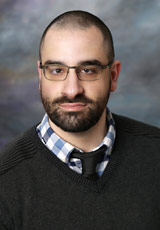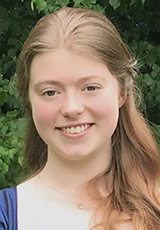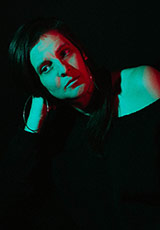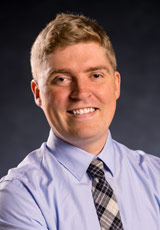Keynote speakers
David Hofmann

ARTS MATTERS: Right-Wing Extremism in Canada: The study of Canadian right-wing extremism from a security context is in its infancy, with only a handful of empirical and theoretical studies emerging on the topic within the last decade. With the increase of right-wing extremism violence in Canada such as the 2014 Moncton shooting and the 2017 Quebec City mosque attack, there is a pressing need to better understand the breadth, depth, and extent of Canadian right-wing extremism. This talk focuses on presenting recent research on Canadian RWE, as well as the preliminary findings from a larger cross-Canadian research project on right-wing extremism in Atlantic Canada (New Brunswick, Nova Scotia, Newfoundland & Labrador, and Prince Edward Island). The talk then concludes with a brief discussion of how undergraduate students can get involved in this type of research.
Dr. David C. Hofmann joined the UNB Sociology department in 2016. His recent funded research is related to terrorist risk and threat assessment, charismatic leadership within terrorist groups, the far-right and anti-government movements in Canada, hate crimes in Canada and the Maritimes, and modeling the fragmentation of trafficking networks upon removal of key actors and leaders. David is research fellow with the Gregg Centre for the Study of War and Society, and is a senior research affiliate with the Canadian Network for Research on Terrorism, Security, and Society (TSAS).
Caitlin Hyslop-Margison

Caitlin Hyslop-Margison is a joint honours undergraduate student in history and sociology at the University of New Brunswick. She has been published as a fourth author on right-wing extremism in Atlantic Canada (Dynamics of Asymmetric Conflict) and has an upcoming publication as a second author on the career of Kathy Charmaz (Symbolic Interaction). Her current research is funded by the Department of National Defense and focuses on identifying and understanding conspiracy theories and hateful conduct in Canada and the Canadian Armed Forces.
Sabine LeBel

Queer Environmental Futures: Future worlds. Alternate realities. Parallel universes. Far off planets. These are just some of the places we may discover in Queer Environmental Futures workshop. What can queering the future bring to the current environmental crises? If we dismantle the colonialism, capitalism, white supremacy, patriarchy and hetero and cis normativity that have brought us to this environmentally precipitous moment, what can we create in their place? This workshop creates space to tell stories about the queer sustainable future that we want to live. Participants are asked to bring an object – physical, virtual, or imaginary – from a queer future to the workshop. We will use these objects to build a queer objects and stories for the future we want to live.
Sabine LeBel teaches in the Media, Arts, and Cultures Department at UNB. She has an art practice, mostly consisting of video work, with pieces screening internationally at Inside Out Festival (Toronto), Out on Screen (Vancouver), and Cineffable (Paris), among others. In 2016, with Casey Burkholder, she started the Fredericton Feminist Film Collective, dedicated to making, screening and talking about works by and for queers, trans folks and women. She is currently working on a multi-media, collaborative project entitled Queer Environmental Futures.
Amy Scott

Amy Scott is an Associate Professor of Anthropology at the University of New Brunswick. As a bioarchaeologist, Amy is interested in the lived experience of past populations and studies the intersections of personhood, health, stress, and mortuary patterns in 18th century Atlantic Canada. Amy is also the Director of the UNB Bioarchaeology Field School at the Fortress of Louisbourg, National Historic Site of Canada.
One of the biggest challenges with studying the past is working with and interpreting a limited dataset. As a bioarchaeologist, I am required to dabble in many disciplines (e.g., history, biology, chemistry, medicine, demography, etc.) to truly understand the lived experience of those who came before us. Using our ongoing work at the 18th century Fortress of Louisbourg as an example, this talk will focus on how collaboration and inter-disciplinary research design has allowed us to bring the past to life at Louisbourg, in exciting and publicly accessible ways.
Matthew Sears

Matthew A. Sears is Associate Professor of Classics & Ancient History at UNB. He works on ancient Greek history, culture, and society, and is the author of Understanding Ancient Warfare (Routledge, 2019), Athens, Thrace, and the Shaping of Athenian Leadership (Cambridge, 2013), and the co-author of Battles and Battlefields of Ancient Greece: A Guide to their History, Topography and Archaeology (Pen & Sword, 2019). He is currently writing a book on ancient Sparta. Originally from Fredericton, he earned his BA from UNB before receiving his PhD from Cornell University in Ithaca, NY.
Talk title: Times of Change and Upheaval in Ancient Greece: Lessons for Today. The ancient Greek historian Thucydides says that human nature is more or less constant, so human events tend to follow similar patterns across time and space. According to this model, if we understand the Peloponnesian War, the great conflict between Athens and Sparta in the 400s BCE, we can better understand events of our own time, including the motives and plans of the people and states involved. We will take a look at some episodes of instability, violence, and disease caused by the Peloponnesian War in Thucydides' writings, and consider how they relate to our own experiences with COVID and other destabilizing forces.
